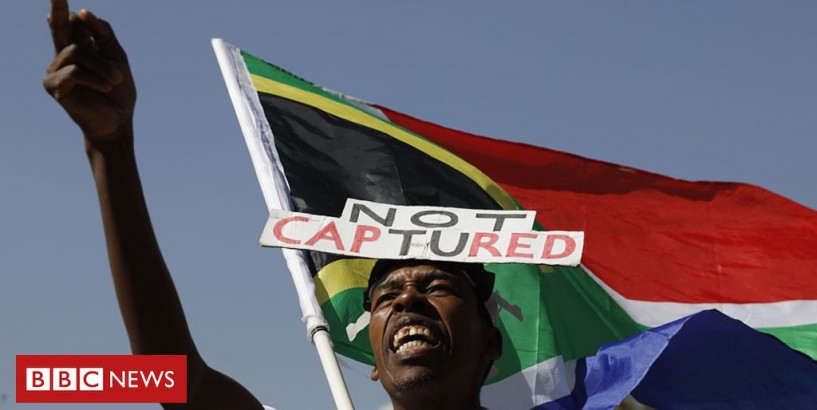South African Airways, the state-owned rail-freight operator Transnet and the energy giant Eskom, one of the world's largest utility companies.
The responsibility for promoting and dismissing public officials lay with Mr Zuma. According to David Lewis, executive director of Corruption Watch, a Johannesburg-based NGO that investigated the Guptas, the president's powers of appointment were key to the success of the alleged conspiracy. As well as ministers, the South African president has the right to appoint the boards of directors of state-owned enterprises and - critically - the heads of law enforcement agencies.
Mr Zuma could do as he pleased, Mr Lewis told the BBC, "as long as he ensured who was appointed the head of the police, and the head of the anti-corruption agency of the police". What was the impact of state capture in South Africa?
The allegations eventually brought the Zuma presidency to a premature end last year and prompted the Guptas to leave South Africa.
They also damaged the reputations of various illustrious firms that had done business with the Guptas.
Ethical lapses were highlighted at the global accounting giant KPMG, management consultants McKinsey and Bain and Co, and the German IT company, SAP. Bell Pottinger, a London-based PR firm with a history of representing repressive governments, was dealt a fatal blow, closing down over its dealings with the Guptas. Image copyright Gallo Images Image caption Duduzane Zuma (r), son of the former president, used to work for the Gupta brothers
State capture has blown a hole through the public finances, disappearing tens of billions of dollars from Africa's most advanced economy. The scandal has also dealt a huge blow to the reputation of the African National Congress, the party that has governed South Africa for nearly 30 years. Many of Mr Zuma's colleagues in the party have, like him, been accused of corruption.
According to Dr Innes, the ultimate victim of state capture tends to be the political system that is corrupted by business interests. "Politics becomes the point of entry and exit into what is fundamentally a financial market for retaining control over the state and its assets," she said. What can be learnt from the South African case?
The alleged conspiracy between the Zumas and the Guptas was eventually stopped by a combination of factors, including pressure from global financial markets that were alarmed by the hiring and firing of ministers in charge of the economy.
Mr Lewis argues that while the country had been let down by certain democratic institutions, such as its prosecutorial and regulatory agencies, it was rescued by others.
These included the independent media, the courts and civil society organisations - all of which had honed their skills fighting apartheid. South Africans, he said, belonged to a "young democracy with a very recent tradition of resistance to authoritarian rule. They don't take things lying down".
Mr Hellman, who testified at the inquiry, says South Africa's open discussion of the impact of state capture had set a positive example for other countries. However, he warned that there was also a risk that any such process ends up being used to settle political scores, rather than to address the "structural issues" that allowed the corruption to flourish.
Jacob Zuma is currently on trial in a separate corruption case. In a 2007 TV interview, he denied that the state had been "captured".
"There is no parliament that is captured, there is no executive that is captured," he said. "State capture is political propaganda."
The interview was given to ANN7, a TV channel founded by the Gupta family. Its former editor told the state capture inquiry that Mr Zuma had been "very much involved in the running of the station".
Having left South Africa, the Guptas are now living in Dubai. Related Topics









